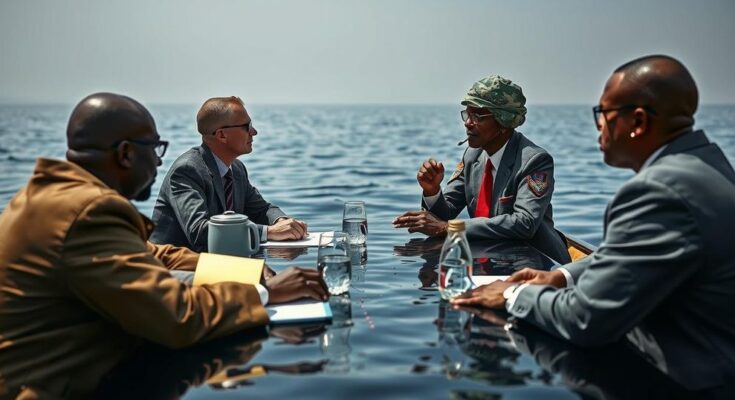The USGS visited Namibia and Botswana from September 10-27, 2024, under the U.S. Ambassador’s Water Experts Program to address water security challenges amid severe drought conditions. The discussions focused on utilizing remote sensing data, improving hydrologic monitoring, and developing scientific solutions for effective water resource management.
From September 10 to September 27, 2024, representatives from the United States Geological Survey (USGS), including Science Advisor for International Water John Lane and Hydrologic Networks Branch Chief Molly Wood, conducted a mission to Namibia and Botswana. This visit was part of the U.S. Ambassador’s Water Experts Program (AWEP), aimed at addressing water security issues in the region. The program is managed by the Department of Interior’s International Technical Assistance Program (DOI ITAP) and funded by the U.S. State Department’s Bureau of Oceans and International Environment and Scientific Affairs. During their visit, USGS scientists engaged with various stakeholders in the water sector, including government ministries, bulk water suppliers, municipal utility operators, multinational water commissions, private consultants, and personnel from the U.S. Embassy. Namibia and Botswana are currently facing significant water challenges due to their semi-arid to arid climates, exacerbated by severe drought conditions. The strain on water resources affects crucial sectors, including drinking water supply, livestock management, mining, and industry. The discussions highlighted the urgent need for technical support to enhance the understanding and utilization of available water resources. Opportunities for USGS support were identified, particularly in areas such as: 1. Utilizing remote sensing datasets to gain insights into water availability. 2. Improving hydrologic monitoring networks to facilitate access to essential hydrologic data, aiding in informed water resource management decisions. 3. Collaboratively developing scientific solutions to optimize groundwater and surface water management in response to ongoing drought conditions. The DOI ITAP has subsequently shared updates related to this visit on their Facebook platform.
Water security remains a critical issue in many regions worldwide, particularly in countries with semi-arid and arid climates such as Namibia and Botswana. These countries are experiencing prolonged droughts that significantly threaten their water resources. Initiatives like the U.S. Ambassador’s Water Experts Program (AWEP) play a vital role in providing technical assistance and fostering international collaboration to address these challenges. The USGS, through its expertise in hydrology and water management, aims to assist these nations in better understanding and utilizing their water resources effectively.
The USGS mission to Namibia and Botswana underscores the growing urgency to address water security challenges stemming from arid climates and prolonged droughts. Through collaborative efforts and the integration of advanced scientific methods, it is possible to foster improved water management practices. The discussions initiated during this visit represent a proactive step towards ensuring sustainable water resource management in both countries, ultimately benefiting their populations and economies.
Original Source: www.usgs.gov




